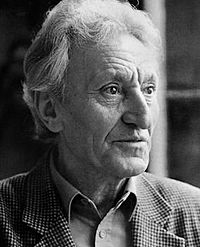Yordan Radichkov facts for kids
Quick facts for kids
Yordan Radichkov
|
|
|---|---|
 |
|
| Born | Yordan Dimitrov Radichkov 24 October 1929 Kalimanitza, Montana region, Bulgaria |
| Died | 21 January 2004 (aged 74) Sofia, Bulgaria |
| Occupation | Writer, playwright |
Yordan Radichkov (Bulgarian: Йордан Радичков; 24 October 1929 – 21 January 2004) was a very famous Bulgarian writer and playwright. Many people think he was one of the most important Bulgarian writers of his time. Some even compared him to famous writers like Franz Kafka or Nikolai Gogol because of his special style.
Radichkov is well-known for his many short stories, novels, and plays. He also wrote the movie scripts for classic Bulgarian films like Torrid Noon (1966), The Tied Up Balloon (1967), and The Last Summer (1974).
In 2000, Radichkov received a very important award from the government called the Order of the Balkan Mountains. A monument was built to honor him in 2007 in Sofia, in the garden of the National Art Gallery.
Early Life and First Jobs
Yordan Dimitrov Radichkov was born on 24 October 1929. His family was poor and lived in the village of Kalimanitza, in the Montana Province of Bulgaria. In 1947, he finished high school in the town of Berkovitsa.
Radichkov started his career in 1951. He worked as a reporter for a newspaper called Narodna mladezh (National Youth). From 1952 to 1954, he was an editor for the same paper. Later, from 1954 to 1960, he worked as an editor for the Vecherni Novini (Evening News) newspaper.
Becoming a Writer
Radichkov's writing career began when he started writing short stories for the Vecherni novini newspaper. His early books quickly got attention from readers and critics. In 1959, he published his first full book, Sarczeto bie za horata (The Heart Beats for the People). After that came Prosti rutse (Simple Hands, 1961) and Oburnato nebe (A Sky Turned Upside Down, 1962). These early works were written in a common style of the time.
Over time, Radichkov's writing style changed. He started using humor and a unique, sometimes strange way of writing. He often included elements from old folk tales and traditions. His stories would make everyday things seem unusual and combine different ideas. He turned reality into a kind of funny play, using laughter to deal with the strange parts of life.
His works often mixed fantasy with real life. They combined modern ideas with images from a very old, mythical past. Some people even called his style "Balkan magic realism". At first, the ruling Communist party didn't like his new style. They sometimes said his writing was too simple or hard to understand.
Much of his writing, both stories and plays, was inspired by the people and traditions of his home region in North-West Bulgaria. His own village, Kalimaniza, was flooded in 1983 to create the "Ogosta" dam. This event became a repeated theme in his writing. It was a way for him to talk about how the "modern" world was losing touch with the older ways of life he remembered. Another big topic in his writing was nature and wildlife. He was very good at showing how villagers and hunters often tell stories in a wild and unexpected way.
Radichkov became very popular and recognized in Bulgaria and around the world. He was even nominated for a Nobel Prize.
His 1966 movie script for Goreshto pladne (Hot Noon) was a big success. It told the story of people trying to save a boy from drowning in a fast river. His 1969 novel, Baruten bukvar (Gunpowder Primer), was one of the first books in Bulgaria to talk about socialism in a new way. It used a powerful mix of humor, fantasy, and old wisdom instead of just making things sound perfect. The award-winning Posledno liato (The Last Summer, 1974) is a story about a man trying hard to stay true to himself in a world that is always changing.
He also wrote several popular children's books. One of them, Nie Vrabchetata (We, the Sparrows), is especially loved in Bulgaria.
Radichkov often drew his own abstract pictures to go with his works. These drawings became another special part of his art.
Radichkov is especially famous for his language. He often used words and phrases from local dialects. Critics have said that "the real main character in the work of Radichkov is the word itself." His writing even added new words and expressions to the everyday Bulgarian language.
Awards and Recognition
Radichkov received many awards for his literature, plays, and films, both in Bulgaria and in other countries. Some of these include:
- The Order of Stara Planina (the highest award in Bulgaria, 2003)
- The Italian Grinzane Cavour Prize (1984)
- The prize of the International Academy of the Arts in Paris (1993)
He was also a founding member and the first president (1984–1991) of the Bulgarian-Swedish Association for Friendship. He received the Swedish national Order of the Polar Star in 1988.
Radichkov was an important person in Bulgaria's public life. He was a member of the Union of Bulgarian Writers since 1962. In 2001, he was elected as a Member of Parliament (MP) for the Bulgarian Socialist Party. However, he quickly resigned because he disagreed with some things and spent his last years staying away from politics.
Radichkov's works have been translated into more than 30 languages. In 2001, he was nominated for the Nobel Prize in Literature.
Honour
Radichkov Peak is a mountain peak on Livingston Island in Antarctica. It is named after Yordan Radichkov to honor him.
See also
 In Spanish: Yordán Radíchkov para niños
In Spanish: Yordán Radíchkov para niños
 | Charles R. Drew |
 | Benjamin Banneker |
 | Jane C. Wright |
 | Roger Arliner Young |

